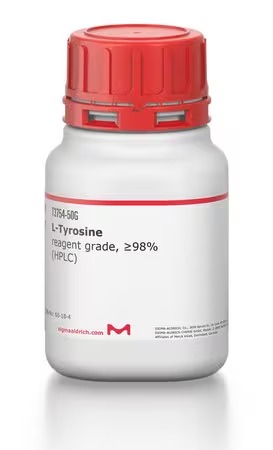Specifications:
| Application | Biochemistry | ||
| Storage Temperature | Ambient | ||
| Product Type | Laboratory Chemical | Forms | Powder |
| Product Brand | Sigma-Aldrich | ||
| Product Grade | Analytical grade | Formula | C₉H₁₁NO₃ |
L-Tyrosine is a non-essential, proteogenic amino acid with a polar side chain that plays a key role in biological processes such as protein synthesis, signal transduction, and neurotransmitter production. It is a precursor for dopamine and other catecholamines, making it crucial in neuroscience and biochemical research.
Chemical Properties:
| Property | Details |
|---|---|
| Linear Formula | 4-(HO)C₆H₄CH₂CH(NH₂)CO₂H |
| Molecular Weight | 181.19 g/mol |
| CAS Number | 60-18-4 |
| Beilstein Registry | 392441 |
| EC Number | 200-460-4 |
| MDL Number | MFCD00002606 |
| SMILES String | NC@@HC(O)=O |
| InChI Key | OUYCCCASQSFEME-QMMMGPOBSA-N |
Physical Properties:
| Property | Details |
|---|---|
| Appearance | White to off-white powder |
| Melting Point | >300 °C (decomposes) |
| Solubility | Soluble in 1 M HCl (50 mg/mL) |
| Grade | Reagent grade |
| Quality Level | 200 |
| Assay | ≥98% (HPLC) |
Applications:
- Biochemical Research:
- Used to prepare solutions for tyrosinase assays.
- Key substrate in the assay of pepsin activity.
- Signal Transduction Studies:
- Investigated as a phosphate group receiver in kinase-mediated signal transduction pathways.
- Neurochemical Studies:
- Precursor of dopamine and other catecholamines, essential for studying neurotransmitter synthesis.
- Protein Studies:
- Incorporated into studies on protein biosynthesis and structure.
Biochemical/Physiological Actions:
- Role in Signal Transduction:
L-Tyrosine participates in cellular communication as a substrate for phosphorylation by kinases, influencing signaling pathways. - Precursor for Catecholamines:
It serves as a starting material for the biosynthesis of dopamine, norepinephrine, and epinephrine. - Protein Building Block:
As a proteogenic amino acid, L-Tyrosine is directly incorporated into proteins, influencing their function and stability.
Preparation and Handling:
- Form:
Powder form for easy handling and dissolution. - Storage:
Store in a cool, dry place at ambient temperature to maintain stability.
Advantages:
- High Purity:
Assay of ≥98% (HPLC) ensures reliability in research applications. - Versatile Applications:
Suitable for enzymatic assays, signal transduction studies, and neurotransmitter research. - Stable Formulation:
Powder form with long shelf-life under appropriate storage conditions.
Citations and Use Cases:
- Tyrosinase Assays:
- L-Tyrosine is utilized as a substrate to evaluate enzymatic activity. (Reference 1)
- Pepsin Activity Assays:
- Used to determine pepsin activity in biochemical studies. (Reference 2)
- Signal Transduction Studies:
- Explored for its role in kinase-mediated phosphorylation. (Reference 3)
- Dopamine Synthesis Studies:
- Acts as a precursor in the biosynthesis of dopamine and related compounds. (Reference 4)
Sigma-Aldrich L-Tyrosine is a high-quality reagent suitable for diverse applications in biochemistry, neuroscience, and molecular biology. Its role as a substrate in enzymatic assays and its significance in neurotransmitter biosynthesis make it an indispensable tool for research. With a purity level of ≥98%, it offers reliability and precision for scientific studies.
- Pack Size: 1kg 100g 500g 50g




 0
0
